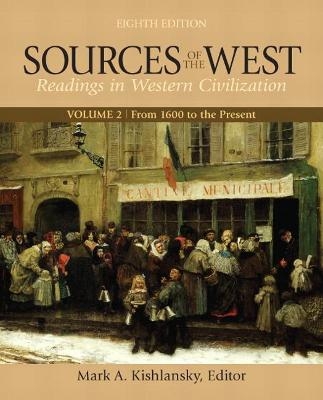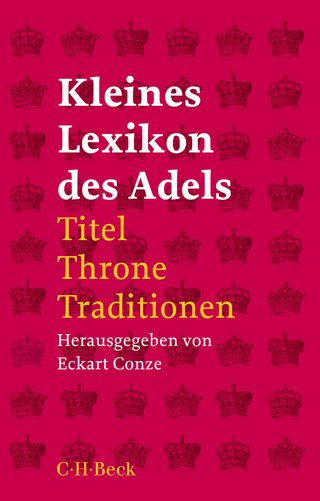
Sources of the West, Volume 2
Pearson (Verlag)
978-0-205-05409-1 (ISBN)
Kishlansky presents a well-balanced selection of readings that integrate coverage of social, economic, religious and cultural history within a traditional, political framework.
Sources of the West includes documents on political theory, philosophy, imaginative literature and social history as well as constitutional documents, all of which raise significant issues for classroom discussions or lectures. By reading the voices of the past, readers can connect them to the present and learn to understand and respect other cultures while thinking critically about history.
Note: MySearchLab does not come automatically packaged with this text. To purchase MySearchLab at no extra charge, please visit www.MySearchLab.com or use ISBN: 9780205098569.
Mark Kishlansky Mark Kishlansky is the Frank Baird, Jr. professor of history at Harvard University. He has a special interest in history of early modern Britain, focusing on the history of politics and political thought. He teaches courses on English social history, the Stuart Age, the English Revolution and the Reign of Charles I. He is a frequent participant in the sophomore tutorial program at Harvard and directs senior theses on British history. His publications include Civilization in the West (5th ed. 2002), A Monarchy Transformed, 1603-1714 (1998), Political Cultural and Cultural Politics in Early Modern England (1995), Society and Culture in World History (1994), Early Modern Europe: The Crises of Authority editor (1988), Parliamentary Selection: Social and Political Choice in Early Modern England (1986) and The Rise of the New Model Army (1979).
Preface
How to Read a Document
Part I: The Origins of Western Civilization and the Classical World
Chapter 1 Creation Epics
The Epic of Gilgamesh (ca. 2000 B.C.E.)
The Creation Epic (ca. 2000 b.c.e.)
The Book of Genesis (ca. 10th–6th century B.C.E.)
Hesiod, Works and Days (ca. 700 B.C.E.)
Chapter 2 The Ancient Near East
Code of Hammurabi (early 18th century B.C.E.)
The Book of the Dead (ca. 16th century B.C.E.)
The Book of Exodus (ca. 10th–6th century B.C.E.)
The Book of Isaiah (ca. 8th–6th century B.C.E.)
The Legacy of Cyrus the Great: The Cyrus Cylinder (6th century B.C.E.) and The Book of Ezra (5th century B.C.E.)
Chapter 3 Ancient and Classical Greece
Homer, Iliad (9th–8th century B.C.E.)
Sappho of Lesbos, Poems (ca. 600 B.C.E.)
Thucydides, History of the Peloponnesian War (ca. 400 B.C.E.)
Xenophon, The Spartan Constitution (ca. 360 B.C.E.)
Plato, Apology (399 B.C.E.)
Plato, The Republic (ca. 327 B.C.E.)
Aristotle, Politics (4th century B.C.E.)
Plutarch, The Life of Alexander (ca. C.E. 116)
Chapter 4 The Roman World
Polybius, The Roman Constitution (ca. 150 B.C.E.)
Cicero, The Trial of Aulus Cluentius Habitus (66 B.C.E.)
Virgil, Aeneid (30–19 B.C.E.)
Juvenal, Satires (ca. C.E. 116)
Plutarch, The Life of Cato the Elder (ca. C.E. 116)
Suetonius, The Life of Augustus (ca. C.E. 122)
The Sermon on the Mount (ca. C.E. 28–35)
St. Paul, Epistle to the Romans (ca. C.E. 57)
Part II: Medieval Europe
Chapter 5 The Early Middle Ages
Tacitus, Germania (98)
Eusebius, In Praise of Constantine (336)
Augustine of Hippo, The City of God (413–426)
Benedict of Nursia, Rule of Saint Benedict (ca. 535–540)
The Burgundian Code (ca. 474)
Gregory of Tours, History of the Franks (ca. 581–591)
Bede, The Ecclesiastical History of England (731)
Einhard, The Life of Charlemagne (ca. 829–836)
Chapter 6 Islam and the Eastern Empire
Justinian, Code (529–565)
Procopius, Secret History (ca. 560)
The Koran (7th century)
Ibn Ishaq, The Life of Muhammad (after 733)
Michael Psellus, Chronographia (ca. 1075–1077)
Ibn Al-Qalanisi, The Damascus Chronicle (ca. 1150)
Chapter 7 The High Middle Ages
Feudal Documents (11th–13th centuries)
Bernard of Angers, Miracles of St. Foy (ca. 1010)
Fulcher of Chartres, The First Crusade and the Siege of Jerusalem (1101–1127)
The Song of Roland (ca. 1100)
Magna Carta (1215)
Francis of Assisi, Admonitions (ca. 1220)
Thomas Aquinas, Summa Theologica (1266–1273)
Dante, The Divine Comedy (ca. 1320)
Catherine of Siena, Letters (1376)
Christine de Pisan, The Book of the City of Ladies (ca. 1405)
Margaret Paston, Letters (1441–1448)
Part III: Renaissance and Reformation 215
Chapter 8 The Renaissance
Francesco Petrarca, Letters (ca. 1372)
Leon Battista Alberti, On the Family (1435–1444)
Giorgio Vasari, The Life of Leonardo da Vinci (1550)
Niccolò Machiavelli, The Prince (1513)
Desiderius Erasmus, In Praise of Folly (1509)
Sir Thomas More, Utopia (1516)
Chapter 9 The New Worlds and the Age of Exploration
Ibn Battuta, Travels in Africa (1354)
Christopher Columbus, Letter from the First Voyage (1493)
Gomes de Zurara, Chronicle of Guinea (1453)
Bartolomé de Las Casas, Apologetic History of the Indies (1566)
Bernal Díaz, The True History of the Conquest of New Spain (1552–1568)
Juan Gonzalez de Mendoza, The History of the Great and Mightie Kingdom of China (1585)
Chapter 10 Religious Reform
Bernard Gui, A Manual for Inquisitors (1331)
Martin Luther, The Freedom of a Christian (1520) and Of Marriage and Celibacy (1566)
John Calvin, Institutes of the Christian Religion (1534) and Catechism (ca. 1540)
Francis Xavier, Letter from India (1543)
Ignatius Loyola, Spiritual Exercises (1548)
Teresa of Ávila, The Life of St. Teresa (1611)
Chapter 11 The Early Modern World
Anonymous, Lazarillo de Tormes (1554)
The Twelve Articles of the Peasants of Swabia (1524); Martin Luther, Admonition to Peace (1525)
Marguerite de Navarre, Heptameron (1558)
Philippe Duplessis-Mornay, A Defense of Liberty Against Tyrants (1579)
Magdalena and Balthasar Paumgartner, Letters (1592–1596)
Part IV: The Ancien Régime
Chapter 12 The Wars of Religion
Henry IV, The Edict of Nantes (1598)
Cardinal Richelieu, The Political Testament (1638)
Hans von Grimmelshausen, Simplicissimus (1669)
Chapter 13 Subjects and Sovereigns
James I, True Law of a Free Monarchy (1598)
Thomas Hobbes, Leviathan (1651)
John Locke, Second Treatise of Government (1689)
The English Bill of Rights (1689)
Duc de Saint-Simon, Memoirs (1694–1723)
Napoleon Bonaparte, The Napoleonic Code (The French Civil Code) (1804)
Acknowledgments
| Erscheint lt. Verlag | 18.8.2011 |
|---|---|
| Sprache | englisch |
| Maße | 185 x 230 mm |
| Gewicht | 457 g |
| Themenwelt | Schulbuch / Wörterbuch |
| Geisteswissenschaften ► Geschichte ► Allgemeine Geschichte | |
| Geschichte ► Teilgebiete der Geschichte ► Kulturgeschichte | |
| Geschichte ► Teilgebiete der Geschichte ► Wirtschaftsgeschichte | |
| Sozialwissenschaften ► Politik / Verwaltung ► Politische Theorie | |
| ISBN-10 | 0-205-05409-9 / 0205054099 |
| ISBN-13 | 978-0-205-05409-1 / 9780205054091 |
| Zustand | Neuware |
| Haben Sie eine Frage zum Produkt? |
aus dem Bereich


